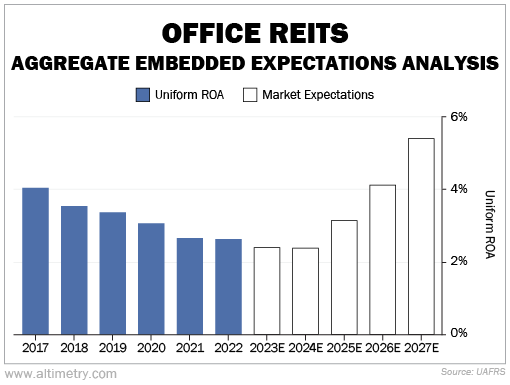 Membership is down... Occupancy rates are falling... And shares have cratered 90% this year...
Membership is down... Occupancy rates are falling... And shares have cratered 90% this year...
That's the situation embattled coworking business WeWork (WE) faces today.
The company was once seen as an exciting innovator that could revolutionize the way we think of office space. Then, a difficult initial public offering ("IPO") tanked valuations.
And when it finally went public in October 2021, WeWork had to adapt to a corporate world forever changed by the pandemic.
Suffice it to say, it failed the test. The company just warned that it may go out of business.
WeWork never managed to adapt to the work-from-home shift. It bet on the growth of shared workspaces, investing heavily in new office spaces. Occupancy in its workspaces fell from above 70% in 2019 to just 50% in 2021.
In an effort to stop the bleeding, WeWork has been exiting leases since 2021. It's scaling back its portfolio and reducing costs.
Those measures weren't enough. Management is concerned about operational challenges and excessive debt that the company is struggling to pay off. And second-quarter earnings failed to meet WeWork's own guidance from three months ago.
While the stock has been on a one-way trip down since its IPO, this year has been exceptionally awful for investors. The company is officially grasping at straws... On Friday, it announced a 1-for-40 reverse stock split to avoid getting delisted from the New York Stock Exchange.
One of the most well-known companies in office real estate is officially sounding the alarm. If and when WeWork goes under, it could cause a ripple effect across the broader office real estate market.
Today, we'll take a closer look at the challenging environment surrounding WeWork – and the broader office real estate sector.
 Offices have reopened... Yet folks aren't rushing to fill them.
Offices have reopened... Yet folks aren't rushing to fill them.
Around 30% of workers in the U.S. still operate under some form of hybrid work environment.
Companies are now reevaluating the need for large office spaces. Many have opted to downsize to save money and adjust to having fewer employees in the office.
This has put a lot of pressure on office space owners like WeWork. These companies struggled during the pandemic and are still struggling today. They have empty buildings... and no one interested in renting them.
Many investors believe WeWork's issues are company specific. They don't realize that this is an industry-wide problem. WeWork could be the first to fall... We doubt it will be the last.
Folks have stopped paying attention to the lingering issues for office real estate. With declining occupancy and looming debt maturities, investors have been waiting for a catalyst.
And with WeWork approaching bankruptcy, they might finally realize that it's time to get out of this sector entirely.
Office real estate investment trusts ("REITs") spend billions of dollars purchasing and managing office real estate. Like WeWork, many of these companies are stuck with empty buildings, piles of debt from purchasing those buildings, and no sign that new tenants are coming anytime soon.
These issues have plunged WeWork to the brink of bankruptcy. Office REITs may soon follow.
 WeWork could be the first domino that kicks off a collapse in the office REIT industry...
WeWork could be the first domino that kicks off a collapse in the office REIT industry...
Yet the market is choosing to ignore these signs.
We can see what investors expect from the sector through our aggregate Embedded Expectations Analysis ("EEA").
The EEA starts by looking at average stock prices across office real estate. From there, we can calculate what the market expects from future cash flows. We then compare that with our own cash-flow projections.
In short, it tells us how well the industry has to perform in the future to be worth what the market (or a prospective bidder) is paying for it today.
At current valuations, the market isn't at all concerned about the outlook for office REITS. In fact, investors are gearing up for a surge in these companies' returns.
Aggregate Uniform return on assets ("ROA") for office REITs dipped below 3% last year. The market expects that number to turn around, surpassing 5% by 2027.
Take a look...

WeWork is a warning that office real estate faces significant headwinds. The world of office work has been forever changed by the pandemic... And those challenges aren't going anywhere.
Yet somehow, investors think the market for office space rentals will get stronger in the future.
 Office REITs have been hurting since the pandemic...
Office REITs have been hurting since the pandemic...
And given low occupancy rates and looming debt maturities, we expect the pain to continue.
Work from home is now a staple of the American economy. This trend will continue to cap returns for office REITs and real estate businesses like WeWork.
All eyes are on WeWork's next move... And it remains to be seen if the company can claw its way back into anyone's good graces.
In the meantime, considering the headwinds facing office spaces – and the market's overall lack of concern – we'd stay away from this industry.
Regards,
Joel Litman
August 22, 2023
Editor's note: Joel successfully predicted the collapses of 39 companies over the past few years... the 2008 crash... the 2020 plunge... and the bull market that followed. Now, he believes a rare event is coming for the market. And it's one most investors aren't expecting...
According to Joel, a massive force is set to shake up stocks in the next few months. Some of the world's most popular companies will be left behind... while a select group is poised for massive upside. To see Joel's latest warning – and learn how you could make 11 times your money – click here for the details.



 Membership is down... Occupancy rates are falling... And shares have cratered 90% this year...
Membership is down... Occupancy rates are falling... And shares have cratered 90% this year...


